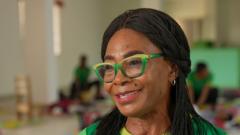In Nigeria, a single mother, motivated by her own daughter's struggles with cerebral palsy, fights to provide essential care for affected children, battling myths and systemic challenges in healthcare.
A Mother's Mission: Transforming Lives of Children with Cerebral Palsy in Nigeria

A Mother's Mission: Transforming Lives of Children with Cerebral Palsy in Nigeria
Joyce Liu / RealTime Wire
In Lagos, Nigeria, a determined mother is on a mission to support children living with cerebral palsy, like her daughter Zimuzo, who was diagnosed with the condition after being adopted from an orphanage. Babatunde Fashola, affectionately known as Baba, is one of the youths cared for at the Cerebral Palsy Centre, founded by Nonye Nweke, who faced similar challenges when trying to educate her daughter about her condition. Cerebral palsy is a prominent issue in Nigeria, believed to stem largely from untreated neonatal jaundice, which affects a significant number of newborns in the country.
Professor Chinyere Ezeaka from the Lagos University Teaching Hospital reports that neonatal jaundice is common, with over 60% of infants experiencing this condition. While many recover quickly, the absence of immediate treatment can result in severe outcomes, including cerebral palsy. Unfortunately, there are minimal resources available to address this issue, with only three cerebral palsy centres in Nigeria serving its population of over 200 million.
Ms. Nweke started the Cerebral Palsy Centre after her personal struggle for Zimuzo's care revealed a heartbreaking reality; other caregivers often refused children with disabilities. Proudly, her centre now supports twelve children, funded by generous donations, but has a long waiting list of over a hundred families seeking help.
At the centre, caregivers meticulously attend to the needs of each child every day, from nutrition provided via feeding tubes to regular muscle massage. The emotional and financial burden of care is immense; managing a child with cerebral palsy can cost around $1,000 a month, a staggering sum in a nation with a minimum wage of $540 annually. The stigma faced by children with disabilities in Nigeria, often associated with misconceptions of spiritual affliction, compounds the difficulties these families endure.
To combat this, initiatives like the Oscar Project aim to increase awareness and tackle the treatment of neonatal jaundice. Supported by key health organizations, the project plans to equip medical facilities and train healthcare workers to boost local capabilities and, ultimately, support parents better.
Despite the challenges and the limitations of the public health system, efforts continue as advocates like Oscar Anderson, a living testament to overcoming disability, push forward for newborn screening and treatment, hoping to improve the lives of children within Nigeria's healthcare landscape. The journey for families like Ms. Nweke's and Baba's is fraught with trials, yet they stand resilient in the face of adversity, focused on the demand for better care and accessibility for those who need it most.
Professor Chinyere Ezeaka from the Lagos University Teaching Hospital reports that neonatal jaundice is common, with over 60% of infants experiencing this condition. While many recover quickly, the absence of immediate treatment can result in severe outcomes, including cerebral palsy. Unfortunately, there are minimal resources available to address this issue, with only three cerebral palsy centres in Nigeria serving its population of over 200 million.
Ms. Nweke started the Cerebral Palsy Centre after her personal struggle for Zimuzo's care revealed a heartbreaking reality; other caregivers often refused children with disabilities. Proudly, her centre now supports twelve children, funded by generous donations, but has a long waiting list of over a hundred families seeking help.
At the centre, caregivers meticulously attend to the needs of each child every day, from nutrition provided via feeding tubes to regular muscle massage. The emotional and financial burden of care is immense; managing a child with cerebral palsy can cost around $1,000 a month, a staggering sum in a nation with a minimum wage of $540 annually. The stigma faced by children with disabilities in Nigeria, often associated with misconceptions of spiritual affliction, compounds the difficulties these families endure.
To combat this, initiatives like the Oscar Project aim to increase awareness and tackle the treatment of neonatal jaundice. Supported by key health organizations, the project plans to equip medical facilities and train healthcare workers to boost local capabilities and, ultimately, support parents better.
Despite the challenges and the limitations of the public health system, efforts continue as advocates like Oscar Anderson, a living testament to overcoming disability, push forward for newborn screening and treatment, hoping to improve the lives of children within Nigeria's healthcare landscape. The journey for families like Ms. Nweke's and Baba's is fraught with trials, yet they stand resilient in the face of adversity, focused on the demand for better care and accessibility for those who need it most.


















